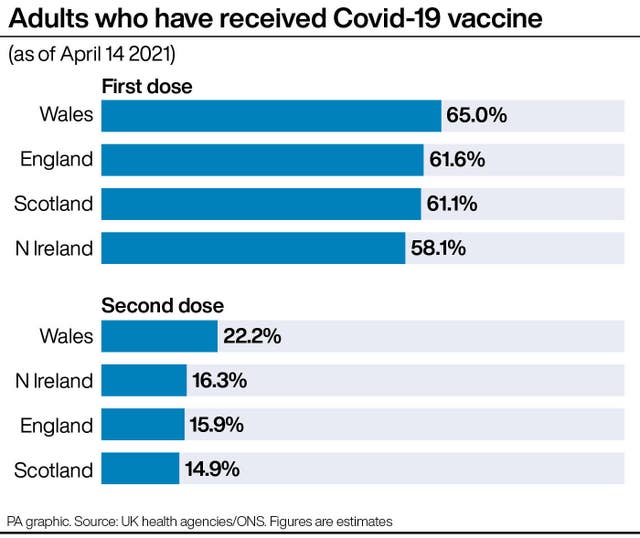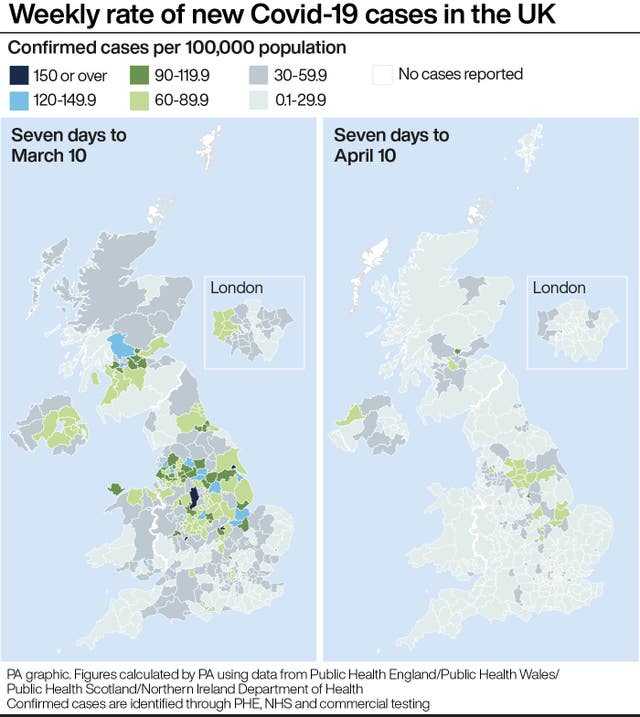
No decisions have been made on an autumn coronavirus vaccination booster programme, but any campaign may be directed at the top four priority groups, an expert has said.
Professor Anthony Harnden, deputy chairman of the Joint Committee on Vaccination and Immunisation (JCVI) also said the risk of blood clots from Covid-19 is far greater for the majority of people who have been offered a vaccine than the risk of a rare side effect.
He suggested some people in the top four groups – those aged 70 and above – are traditionally at risk of immunity waning.
Speaking at a webinar as part of the Royal Society of Medicine’s Covid-19 Series, Prof Harnden said: “It may be that we do an autumn booster campaign directed at those first four priority groups – those that we know that are hugely at risk of of hospitalisations and deaths.

“Although these vaccines seem to work very well in the older population, traditionally antibodies can drop off a bit more frequently in the older population, so we may decide to target this booster vaccine campaign, but we have not decided.
“As soon as we’ve decided and got the evidence for making that decision we, of course, will announce it to allow people to prepare.”
Referring to safety concerns surrounding the AstraZeneca vaccine, Prof Harnden said it needs to be put in the context of millions of doses being given and blood clots being a “very, very rare safety signal”.
He added: “From a vaccine point of view, what we want to look at very carefully on the JCVI is the incident rates in different parts of the population, because of course the risk of clots from Covid is far greater, for the majority of people that have been offered the vaccine, than the risk of the potential rare side effect.
“And so we don’t want to stop the vaccination programme in these risk groups that we’ve identified, but we have said at the moment that we want to be cautious for the well under 30-year-olds.
“It is a worry, but getting into context you’re still much much more likely to have a severe clot from Covid itself than the vaccination.”

Earlier on Thursday, Professor Sir John Bell, Oxford University’s regius professor of medicine, told Sky News: “We don’t have clear enough data on what the risks of these strange clots actually are with the different vaccines, and that data is coming together at the moment.
“We know for sure there’s a small risk associated with the AstraZeneca vaccine but also with the JJ (Johnson & Johnson) vaccine.
“I suspect there will be risks associated with the other vaccines that use the spike antigen as the target.
“This is more a function of the spike antigen, which is the thing that you make your antibody response to, than it is to the way you administer the vaccine.”
Prof Harnden was asked how he felt about vaccinations being made compulsory for people in some professions.
He said the situation may differ between those already in employment and people applying for new jobs.
“It may become an occupational health requirement to be immunised before you’re appointed to either being somebody working with vulnerable older people, vulnerable people either in the hospital or social care sectors. So I can sort of see that coming.
“I think it’s very difficult, I would think, from an employment perspective, to make vaccination compulsory to those that are already employed without a change of government legislation on that.”

Prof Harnden also emphasised the need for people to continue to be careful as lockdown measures are eased, setting out that the country will be in a much better position once every adult has been offered a jab.
He said: “I do think that we need to all still be very cautious, even though we’re pleased about getting our freedoms back.
“I still will urge the public – who have been fantastic, really, really good – just to carry on being cautious and just take it slowly, step by step.”
The comments come as Professor Tim Spector of King’s College London, lead scientist on the ZOE Covid Symptom Study app, suggested herd immunity may be starting to come into effect.
According to the study there are 1,601 new symptomatic cases of the virus in the UK on average, and one in 1,969 people on average have symptomatic Covid-19.
Prof Spector said: “With up to 60% of the population vaccinated and around 5-10% with natural immunity due to infection, we’re starting to see herd immunity take effect.
“This should prevent future large-scale outbreaks. However, we do expect to see smaller, manageable outbreaks in the coming weeks and months among groups which are yet to be vaccinated.”


Comments: Our rules
We want our comments to be a lively and valuable part of our community - a place where readers can debate and engage with the most important local issues. The ability to comment on our stories is a privilege, not a right, however, and that privilege may be withdrawn if it is abused or misused.
Please report any comments that break our rules.
Read the rules here